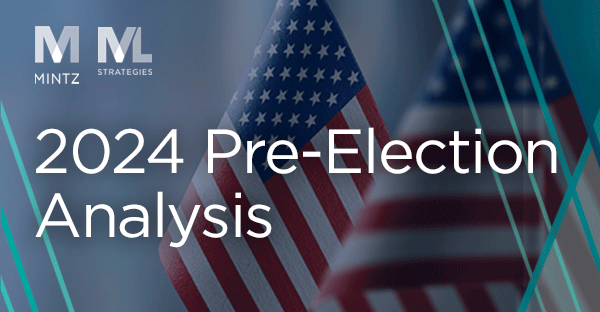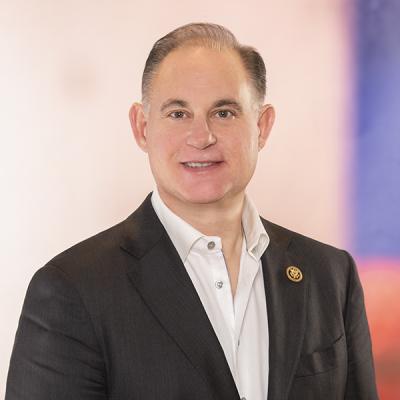2024 Pre-Election Analysis: Infrastructure
In this installment of ML Strategies’ Pre-Election Analysis series, we join with our partners in the Public Finance Practice at Mintz to discuss the potential implications of the 2024 general election for infrastructure policy for the incoming presidential administration and 119th Congress.
For the entire Pre-Election Analysis series, visit our website to read previous guidance on energy & sustainability, US-Canada cross-border issues, tax issues, health care issues, and international trade, and check back regularly for future topics in the lead up to the November 5 election.
Infrastructure Policy in a Harris Administration
One of the most significant accomplishments of the Biden-Harris administration has been the $1.2 trillion Infrastructure Investment and Jobs Act (IIJA). The IIJA authorized spending over a five-year period, starting in fiscal year 2022 and extending through September 30, 2026. After that date, any remaining unspent funds would need to be reauthorized or addressed through new legislation, which would be a top priority for a Harris administration.
Broadly speaking, if she prevails in the general election, Vice President Harris can be expected to stake out positions on infrastructure policy that continue and expand upon the goals of the IIJA with a focus on:
- Sustainable infrastructure through investments in green infrastructure, aiming to address climate change by promoting sustainable transportation systems, energy-efficient buildings, and renewable energy projects.
- Modernization of existing transportation networks with upgrades to ports, roads, bridges, and public transit systems to improve safety and efficiency.
- Equity in infrastructure development that prioritizes infrastructure investments that benefit underserved communities and address long-standing issues of environmental justice and economic disparity.
- Climate resilience that places a premium on building infrastructure that can withstand climate-related challenges, such as severe weather and rising seas.
Many of these goals would be pursued through the upcoming surface transportation reauthorization bill, which was last included in the IIJA and is up for renewal in 2026, with efforts to draft the legislation starting in 2025.
Building upon the work of the Biden-Harris administration, we would look for a Harris-Walz administration to strongly support public-private partnerships (PPPs) for infrastructure development projects. As vice president, Kamala Harris has spoken directly to PPPs, noting that these partnerships are crucial for addressing the significant infrastructure needs in the US and leveraging private sector investment to complement federal funding.
There could be serious consideration of a National Infrastructure Bank proposed in this Congress by Reps. Daniel Webster (R-FL) and Colin Allred (D-TX), which would facilitate through federal leverage, capital infusions in projects and communities not well served by existing state and local financings. The traditional public finance community is skeptical that this mechanism is superior to conventional tax-exempt financing, but some Democrats want to develop a more federal infrastructure solution.
In support of equity in infrastructure, look for a Harris-Walz administration to continue and strongly enforce the Biden-Harris administration’s Justice40 initiative, which was by created by President Biden via executive order and is aimed at addressing the disparities in federal investment by ensuring that 40% of the benefits from certain federal programs go to disadvantaged communities.
Infrastructure Policy in a Second Trump Administration
Despite his previous administration’s stated focus on infrastructure, Donald Trump did not launch major programs during his term. As a candidate, Trump has suggested that he would aim to dismantle federal initiatives like the IIJA. If Trump wins a second term, the Biden-Harris administration will prioritize finalizing IIJA spending before they leave office. The final year of IIJA funding begins October 1, 2025, which would overlap with a potential second Trump administration. However, many IIJA projects are popular in red states and districts, a consideration that may complicate Trump’s efforts to dismantle the program, given their appeal to voters and some Republican members of Congress. Should he return to the White House, the former and perhaps future president would focus his infrastructure development priorities through the lens of:
- Streamlining regulations by reducing bureaucratic red tape to expedite infrastructure projects, arguing that this will help to speed up the construction and repair of roads, bridges, and other critical systems.
- Public-private partnerships aimed at leveraging private sector investment in infrastructure, with the belief that federal partnerships with businesses can drive innovation and efficiency.
- Energy infrastructure with a strong focus on expanding and modernizing pipelines, refineries, and energy distribution networks.
- Border infrastructure with a priority on strengthening barriers and surveillance systems as part of his broader immigration policy.
Recently, Trump has mentioned the merits of creating a federal sovereign wealth fund like that existing in other countries such as China, Russia, and Saudi Arabia. For example, the revenues from his tariffs program could be used for infrastructure investments. It will be interesting to see whether this concept is fleshed out during the campaign.
ML Strategies will closely monitor any proposal from a future Trump administration to eliminate or limit tax-exempt municipal bonds, which are a crucial mechanism for financing infrastructure projects, making them more affordable and accessible for public and non-profit entities while providing a stable investment option for bondholders. Elimination of tax-exempt private activity bonds was initially included in the 2017 Tax Cuts and Jobs Act (TCJA) — a key success for the previous Trump administration — but was forcefully opposed by many in the public finance sector and was left intact although advance refundings were eliminated. The TCJA will see many provisions expire, or “sunset,” at the end of 2025. This issue is covered in our Pre-Election Analysis for Tax Issues. The pending expiration of portions of the TCJA next year means we are looking ahead to debate over a new tax bill where tax-exempt municipal bonds could once again be in peril.
Democratic Leadership Priorities for Infrastructure in the 119th Congress
In the next Congress, Democrats on the House Committee on Transportation & Infrastructure will continue to be led by Rep. Rick Larsen (D-WA), regardless of which party holds the House majority. As the current Ranking Member, Rep. Larsen has championed numerous infrastructure initiatives aimed at modernizing transportation systems — such as roads, bridges, and public transit — to improve safety and efficiency. He also advocates for upgrading port and maritime infrastructure to bolster trade and economic growth, reflecting Washington state’s maritime significance. Larsen supports green infrastructure and sustainable practices that address climate change by enhancing resilience to extreme weather and rising sea levels. Expanding broadband access in rural and underserved areas is another priority to bridge the digital divide. Additionally, he has focused on the importance of investing in infrastructure to create jobs and support workforce development by providing training and employment opportunities.
Meanwhile, the Senate Environment and Public Works (EPW) Committee will experience new Democratic leadership with the retirement of Sen. Tom Carper (D-DE). Sen. Sheldon Whitehouse (D-RI), the current chairman of the Senate Budget Committee, is next in line to replace Carper. Known for his progressive stance on climate change, Whitehouse is expected to focus on enhancing climate resilience and environmental sustainability through investments in green infrastructure and renewable energy. His priorities will likely include strengthening coastal infrastructure to protect Rhode Island’s vulnerable communities and ecosystems, improving clean water infrastructure by upgrading treatment facilities, and addressing water quality issues.
In the Senate, mass transit falls under the jurisdiction of the Senate Banking, Housing, and Urban Affairs Committee, which is currently chaired by Senator Sherrod Brown (D-OH), who is up for reelection this year. Should he win another term, he is expected to continue in the Democratic leadership post at the Committee, where his transit priorities have included increased funding for and equitable access to mass transit, infrastructure modernization, transit-oriented development, the environmental benefits of public transit for the environment, and the role of public transit in job creation.
Republican Leadership Priorities for Infrastructure in the 119th Congress
House Transportation & Infrastructure Committee Republicans' current Chairman, Sam Graves (R-MO), will remain in his leadership position regardless of whether Republicans are in the majority or minority. He has supported bipartisan solutions to address infrastructure challenges and has a focus on reducing regulatory hurdles and streamlining the permitting process to expedite project approvals and minimize bureaucratic delays. Additionally, he supports exploring funding mechanisms, such as public-private partnerships, to leverage private investment in infrastructure. A key part of his agenda is addressing the infrastructure needs of rural areas, ensuring that these communities receive the necessary investment for their roads, bridges, and other essential infrastructure.
Senator Shelley Moore Capito (R-WV) will continue to lead Republicans at the Senate EPW Committee, where her work on infrastructure has focused on the need to invest in and modernize transportation infrastructure, including highways, roads, and bridges, to improve safety, efficiency, and mobility. In addition to public-private partnerships, she supports reducing regulatory burdens and streamlining the permitting process to expedite project approvals and completion. With a particular focus on West Virginia, Capito prioritizes enhancing infrastructure in rural areas, such as roads, bridges, and broadband access, to foster economic growth and connectivity. Additionally, while advancing infrastructure development, she supports integrating environmental considerations to ensure projects align with sustainability goals.
Opportunities for Bipartisan Collaboration
While the two political parties, including their presidential nominees, have deep differences in how they view the regulatory powers of the federal government, including for infrastructure, there is a shared goal of ensuring that the nation’s infrastructure is meeting the day-to-day needs of citizens and supporting a growing economy. Areas that have seen bipartisan support include broadband access, especially in rural or underserved areas, water infrastructure and the need to provide clean drinking water, and the use of public-private partnerships to finance and deliver infrastructure projects.
With the IIJA set to expire on September 30, 2026, some parts of the bill might face challenges in gaining bipartisan support for renewal in the next Congress. However, the IIJA included the regular five-year reauthorization of federal programs for highways, highway safety, transit, and rail, covering fiscal years 2022 through 2026, providing $567 billion in resources from the Highway Trust Fund and General Fund to the US Department of Transportation. Historically, the surface transportation reauthorization has been a bipartisan effort, and it is expected to continue in that spirit.
We previously noted that tax-exempt municipal bonds might face challenges in the 119th Congress, especially if both the administration and Congress are led by Republicans. Despite this, there is potential for bipartisan support to restore advance refunding of tax-exempt bonds, which was eliminated by the TCJA. Advance refunding allows municipalities to refinance existing debt before the original bonds mature, potentially lowering interest rates and reducing debt service costs. This reduction can free up funds for new infrastructure projects or maintenance. Current legislation in both the House and Senate, including the Investing in Our Communities Act (H.R. 1837), the LIFT Act (H.R. 8396), and the LOCAL Infrastructure Act (S. 1453), aims to restore this option. Additionally, the LIFT Act proposes raising the maximum bond issuance limit for bank-qualified bonds from $10 million to $30 million and applying this cap to the borrower rather than the issuer. This would enable governmental conduit issuers to issue bonds on behalf of multiple small institutions and benefit infrastructure projects nationwide. Both issues could be key topics for bipartisan action in the tax policy debate of the 119th Congress.
Closing Thoughts
In conclusion, a robust infrastructure policy is vital for economic growth, public safety, and quality of life. Investing in modern, resilient infrastructure meets current needs and prepares us for future challenges with effective policies supporting key areas like transportation, energy, and digital connectivity while addressing climate change and inequality.
ML Strategies and Mintz are well-prepared to help interested stakeholders achieve their infrastructure policy goals and welcome the opportunity to start a conversation with you about how we can support your efforts.




